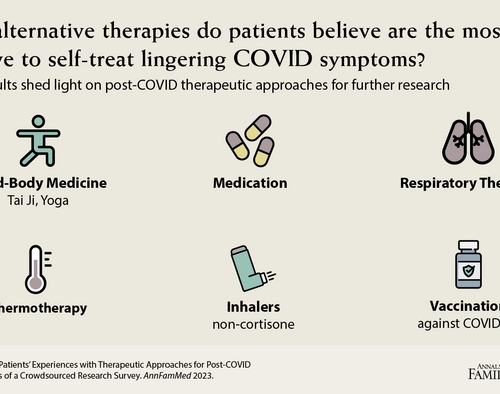AMERICAN ACADEMY OF FAMILY PHYSICIANS Japanese researchers examined the association between primary care practice characteristics and total hospitalizations during the COVID-19 pandemic. They conducted a nationwide study and examined data from 1,161 participants ages 40-75. They assessed the quality of primary care attributes, including first contact between the patient and a primary care clinician, length of care,...
Tag: <span>Primary care</span>
Primary care plays a role in helping patients with long COVID symptoms by providing holistic, trustworthy care
AMERICAN ACADEMY OF FAMILY PHYSICIANS IMAGE: KLOCKE, C. PATIENTS’ EXPERIENCES WITH THERAPEUTIC APPROACHES FOR POST-COVID SYNDROME: RESULTS OF A CROWDSOURCES RESEARCH SURVEY CREDIT: ANNALS OF FAMILY MEDICINE UNIVERSITY OF MICHIGAN Many people are experiencing a variety of long COVID-19 symptoms and are relying on some of their own methods to allay those symptoms. Others are...
New tool helps primary care providers address chronic pain and opioid prescribing
by Indiana University Screenshot of OneSheet, annotated. © 2022 Epic Systems Corporation. Credit: JAMIA Open (2022). DOI: 10.1093/jamiaopen/ooac074 The Chronic Pain OneSheet, a clinical decision support tool developed by the Indiana University Richard M. Fairbanks School of Public Health, is now available for all primary care providers this month at Eskenazi Health. Designed to help primary care providers treat patients with...
Managing Migraine in Primary Care: 5 Things to Know
Vera Gibb, DNP, MSN April 25, 2022 Globally, migraine is second among leading causes of years lived with disability. Migraine affects about 15% of the US population and is one of the most common and debilitating conditions encountered by primary care providers (PCPs). About 1 in 10 patients present with a complaint of headache to their PCP and 75% of these patients have...
Psoriasis diagnoses in primary care may be delayed by up to five years
by University of Manchester Credit: Estzer Miller on Pixabay Psoriasis may be underdiagnosed in UK primary care settings, according to research led by researchers from The University of Manchester. The findings, published in the British Journal of General Practice, show that missed opportunities for early diagnosis of the potentially debilitating condition are relatively common in general practice....
New tool to help primary care clinicians screen for eating disorders
by Mark Derewicz, University of North Carolina at Chapel Hill School of Medicine Credit: Unsplash/CC0 Public Domain A first-of-its-kind tool to help expand care for patients with eating disorders is now available to primary care physicians across the U.S. The NCEED Screening, Brief Intervention, and Referral to Treatment for Eating Disorders (SBIRT-ED) tool lets providers quickly...
‘Where Does It Hurt?’: Primary Care Tips for Common Ortho Problems
Roxanne Nelson RN, BSN April 29, 2022 Knee and shoulder pain are common complaints for patients in the primary care office. But identifying the source of the pain can be complicated, and an accurate diagnosis of the underlying cause of discomfort is key to appropriate management — whether that involves simple home care options of...
Nutrition in primary care yields health and economic benefits
by Griffith University Credit: Pixabay/CC0 Public Domain Personalized nutrition advice from primary healthcare providers including General Practitioners is better than usual care at improving a person’s health and costs little more, a Griffith University study has found. Researchers from Griffith’s Healthy Primary Care team conducted an international review of published health studies from the UK, Ireland, Western Europe, The...
National study reveals new insights into avoidable harm in primary care
NIHR GREATER MANCHESTER PATIENT SAFETY TRANSLATIONAL RESEARCH CENTRE A national study* of general practices in England has revealed the frequency of incidents of significant avoidable harm in primary care, and also important new details. For example, according to the research the main causes are diagnostic error (more than 60%), medication incidents (more than 25%) and delayed referrals...
Why it’s so important to have a primary care doctor
A new Northwestern Medicine study was the first to directly compare the quality and experience of outpatient care between adults with or without primary care. It found that Americans with primary care received significantly more high-value healthcare—such as recommended cancer screenings and flu shots—and reported better patient experience and overall healthcare access, compared to those...





